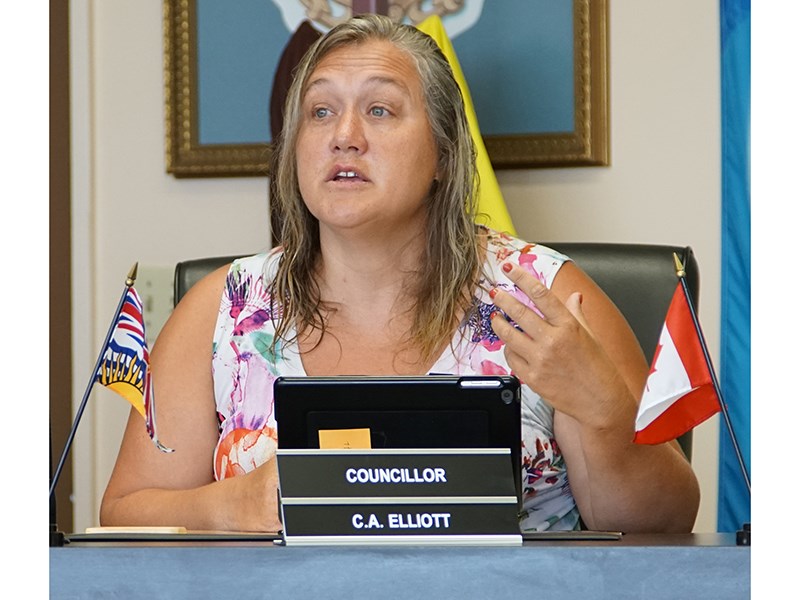Two City of Powell River councillors took time at the June 1 committee of the whole meeting to remember the 215 children discovered in an unmarked, undocumented burial site at a former Kamloops residential school.
Councillor George Doubt said he heard the news about the 215 children when it was first announced. He said he grew up in Kamloops and when he looked out the window of his high school, he could see the residential school across the river.
“It didn’t look then like it does now,” said Doubt. “It sat in the middle of a sagebrush desert, apart from everything. When I graduated, they were just in the process of closing that building.”
Doubt said he met one student, who became a friend of his, who had transferred from the residential school to the high school. Doubt said his friend lasted in the high school for about a month and couldn’t handle the culture change.
“I knew from meeting individuals I’d bumped into, working around the interior, in all the small places with large aboriginal communities, who had told me the stories of what they went through and what they thought other people had gone through in residential schools,” said Doubt. “I had a view that it was something that had happened long in the past, and that the federal government should apologize for it, and other people should.
“I’m looking at the truth and reconciliation report that came up with numbers. They identified 3,200 children in a register of confirmed deaths. They realized there were others who were unidentified.”
Doubt said in Kamloops, the truth and reconciliation commission thought 51 children had died, and four of those, they had not identified or recorded a cause of death.
“They discovered 215 more,” said Doubt. “I spent most of the time thinking about what was going on when it was announced, thinking about what was going on across the river from me as I grew up. It’s given me a different point of view on the world.
“I sat there in a place of white privilege and looked across at people who were having atrocities placed on them by Canadians. I went and got some shoes from the basement, shoes my grandchildren have worn – grandchildren I’ve been privileged to see grow up. First Nations people from around this province have had their children and grandchildren stolen from them and haven’t had the opportunity to go in their basements and look for grandchildren’s shoes.”
Doubt said racism and discrimination are happening now and more needs to be done about it. He said he was calling on mayor Dave Formosa to appoint a committee to talk to the people of Tla’amin Nation and see if there is a way that fits with their tradition, cultural values and laws, that the city could get together with their leadership and somehow make atonement for what has happened.
“They deserve an apology from me and the people of the City of Powell River,” said Doubt.
Mayor accepts challenge
Formosa said children from Tla’amin were sent to residential schools. He said he believed what Doubt was requesting would happen and it will start when it’s put on the agenda of the next committee of the whole meeting to speak about the city name change.
“I’ll take you up on that challenge,” said Formosa.
Councillor Cindy Elliott, who chaired the committee of the whole meeting, spoke next and said she comes from a little town called Kitwanga, which means valley of the rabbit in Gitxsan, of which some of her ancestors are from. She said she grew up with the indigenous children of surrounding villages because they didn’t have to go to residential school anymore.
She said she had adopted a couple of children who were subjected to early childhood trauma and has learned what the effects of that trauma has done to them, and why they behave differently.
She said her classmates’ parents and grandparents had all been to residential school. She said her own grandfather was in a residential school.
“The expectations you have of children and how they behave is completely different when there is childhood trauma involved,” said Elliott. “You can’t really understand it without living it.”
She said when she tries to share how very heartbreaking the history of many of these people is outside of First Nations communities, she tends to get a heavy feeling because the caring for those stories is not there.
Councillor reflects on walk
Elliott said on May 31, she walked from Myrtle Rocks to Willingdon Beach and then followed the remembrance procession online until it reached Tla’amin Village.
“The warm welcome Tla’amin Village had for these people who cared enough to walk was so amazing,” said Elliott. “They wrapped Aaron George in a blanket and gave him gifts. He was in tears and beside himself because he didn’t believe he deserved any such thing.
“When I went to Willingdon Beach for the ceremony, I was uplifted and I was so happy to see the members of our community who came. The numbers were overwhelming for people to come to Willingdon Beach to show they cared. I’ve never participated in a session that had that feel to it. I want to thank the bighearted people of this community for being there for us.”
Elliott said she had written a post to Facebook on her thoughts and she wanted people to be aware that she, as a city councillor, is prepared to participate and put her energy behind it and put her heart on her sleeve and lead a conversation in this community about the name Powell River.



